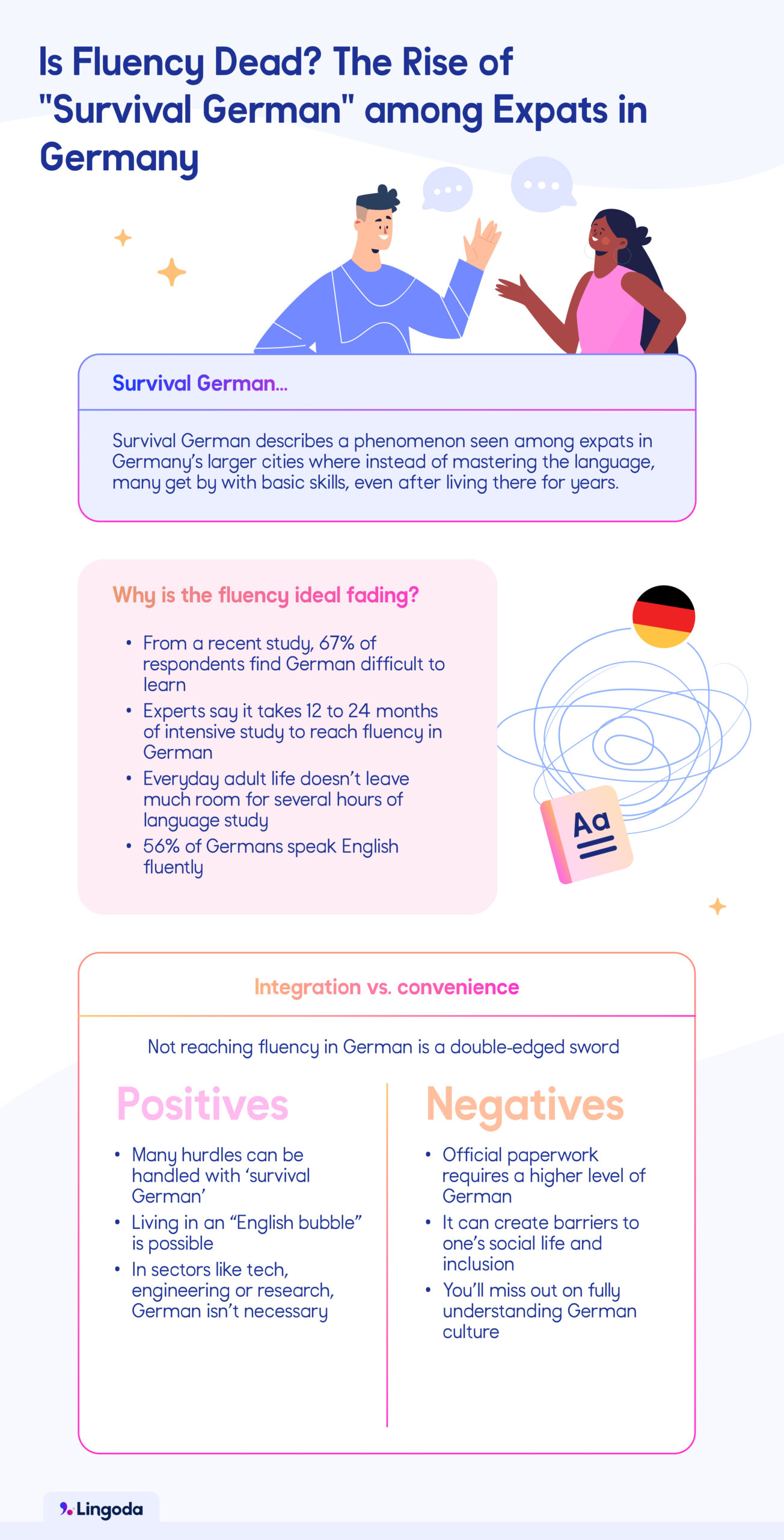Is Fluency Dead? The Rise of “Survival German” Among Expats in Germany

Are you familiar with the term “survival German”? If you’re picturing a hardcore survivalist like Bear Grylls braving the wilderness with only a cheat sheet of German vocabulary, you’re actually not so far off. “Survival German” refers to a phenomenon among expats in bigger German cities, in which many choose not to master the language but instead try to get by with basic skills — even after living in Germany for years.
Why is this happening? It’s not because learning a new language has become harder, nor is it because German specifically has lost its value. It’s simply easier to get by in English these days.
An impressive 56% of Germans speak English fluently, though that number is closer to 90% in bigger cities like Berlin. With English cropping up everywhere from international offices to local supermarkets, it’s certainly possible to navigate daily life in Germany without speaking German fluently. So, it’s no surprise that part of the growing expat workforce in Germany has adopted a minimalist language strategy.
- Fluency as the traditional ideal (and why it’s fading)
- Real challenges: Why German fluency is elusive
- Integration vs. convenience: The cultural trade-off
Fluency as the traditional ideal (and why it’s fading)
Although the “survival German” trend has gained momentum in recent years, it wasn’t always this way. Traditionally, expats who moved permanently to a country for professional or personal reasons aspired to fluency in the local language. While it’s not fair to say that this has changed for the majority of expats and immigrants, certain realities make it more difficult for German learners to reach the B1 or B2 proficiency most language schools and integration courses recommend.
For one, German is not known as an easy language. In a recent study, 67% of expat respondents rated German as difficult to learn, which can be frustrating when you’re also juggling a new job and adjusting to a new culture. Linguistic experts have compared the long slog of mastering German to running a marathon, as it can take one to two years of intensive study (i.e., two to three hours everyday) to reach fluency.
Very few working professionals can afford that time. While German is still the most widely spoken language in Europe, with more than 15 million people learning it globally, complete fluency continues to elude many expats.
Real challenges: Why German fluency is elusive
German’s reputation as a difficult language is well-earned. German grammar is notoriously complex, confronting learners with four cases, three genders and almost as many exceptions as there are rules. For native English speakers — or anyone coming from a more “straightforward” language — learning German can feel like a steep climb.
Perhaps no one ever put it better than the famed American writer Mark Twain, who once claimed that “a gifted person ought to learn English (barring spelling and pronouncing) in 30 hours, French in 30 days and German in thirty years.”
Everyday life as an adult doesn’t leave much room for several hours of language study each day. And to make matters worse, many native speakers tend to switch to English upon hearing an accent. This combination of factors can make the language journey a long and daunting one.

Integration vs. convenience: The cultural trade-off
While many situations can be handled with “survival German,” certain hurdles — like rental contracts and tax forms — still require a certain level of language proficiency. But it doesn’t stop there. Sticking to very basic German can have consequences for your social life, too, as it can make it harder to find friends and feel included.
In bigger cities, where living in an “English bubble” is possible, many expats mostly connect with fellow internationals. While this can still be fulfilling, learning the language remains key if you intend to get the full picture of a culture. Without speaking German, some doors to the country you’re living in will inevitably stay closed.
The workplace shift: Is German still required on the job?
The shift toward “survival German” becomes easier to understand when you consider recent changes in the German professional environment. Depending on the field, it’s now possible to work for many German companies without speaking German at all. Especially in sectors like tech, engineering and research, speaking German is not necessarily a requirement — though strong German skills are a precondition for jobs in HR or law.
Rethinking language goals in Germany
There are several reasons why a shift away from language proficiency is becoming more common among many expats. Pragmatically, the demands of everyday life have increased dramatically for everyone — not just expats — due to higher expectations at work and an overall faster pace of life. . Taking time to learn a language like German, which is known for its complexity and inaccessibility, is often not realistic.
Furthermore, German culture has become more international and English is widely spoken, especially in big cities. It has even become possible to work in Germany without speaking German at all. Nevertheless, something is lost when fluency is no longer the goal. To get full access to a new country, speaking the language is still a necessary requirement and comes with its own rewards. Ultimately, “Is fluency still the goal?” might not have a one-size-fits-all answer.













